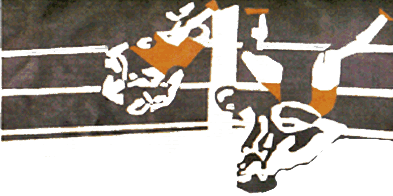
| Archive 02/12/01 - CURRENT |


|
In Newspapers Benjamin
Franklin was a pretty well-rounded guy: one of the founding fathers
of the United States of America, a leading inventor and scientist
(the Franklin stove, bifocal glasses and the lightening rod), an
accomplished musician and an enthusiastic vegetarian. He was also
a journalist of some renown. This last bullet point on the curricula
vitae is worth reflecting on, in light of recent discussions about
the value of "educating" journalists. In Franklin's time,
there was no J-school. His introduction to the world of journalism
was as an apprentice (at the age of 12) at his older brother's newspaper
printing operation; varied life experiences, a voracious appetite
for reading, and a burning curiosity informed his writing (that,
and a rather prodigious intellect).
In the two hundred-odd years since Franklin died, the world of journalism has changed a great deal. Polemics has given way to packaging, as various media try to seduce an increasingly numbed audience; the forum for 18th century civic debates, the newspaper, has lost considerable influence and importance. It has lost it, partly, because of new media alternatives, but it has also lost it because of the way modern journalism is being practiced. Since the advent of journalism school in 1908 at the University of Missouri, there has been considerable contention with the notion that a "trade" could - or should - be taught in a university setting. So as to justify their existence in universities, J-schools have developed curricula that cover the arcana of the profession, with only passing concern for what makes for a good journalist: a breadth of knowledge, an understanding of history and civic issues, an inquisitive nature and good writing skills. Some of this cannot be taught: the motivation to be curious and read widely comes from within. The rest can, but not in J-school (an understanding of history, a civic mindedness and general literacy can, if one's lucky, develop out of a liberal arts education). But most of what makes for a good journalist is practice. Instead, what a J-school student gets is this:
You
could call these courses "trade" courses, but that would
be a disservice to legitimate trades. What these courses really
represent is a crass justification for publishers to push employee
training downstream (have schools do what publishers used to do),
and for universities to profit from a high-margin program (relatively
little research; exploitation of adjunct professors; professional
tuition fees, etc). The problem, though, is that by focusing on
such rote skills at university, our future journalists are rarely
forced to think, to question, or to justify. They view their profession
as some sort of automated process: take news lead, insert into story
template 41A, wait 12 hours for editorial pasteurization, then remove
bland, shapeless object and hand off to legal. And repeat - again,
and again. The proof that many journalists no longer think for themselves
is evident in the rise of public relations firms and special-interest
groups: Whereas journalists used to seek opinions from the small
business owner in Vanessa, Ontario, now they wait for a press release
from the Canadian Federation of Independent Business; Whereas they
used to investigate the state of water pollution in Halifax, now
they wait for the Sierra Club to give them a call. Whereas as they
used to create their own narrative, now they take dictation from
Hill & Knowlton. Which
brings me back to Benjamin Franklin. He once said that, "any
fool can criticize, condemn, and complain - and most fools do".
Well, I guess I'm that fool. And I'm happy to play the fool and
leave journalism to qualified practitioners. But that's the crux
of the issue: qualified for what? A modern J-school education may
produce newsroom leaders with unparalleled time management and computer
skills, but can they write with clarity, in a comprehensive, accurate,
reliable and independent manner? Do they read widely, and can they
ask intelligent questions? And would they know a fool from a wise
man? Matt O'Grady is the one sulking in the corner.
|

| TODAY |

|
UNDER MOMMA'S WINGS |
|
FATLIP SATURDAY |
|
CJ |
|
IN NEWSPAPERS |
| THE 2002 GREY
CUP |
|
NOTES |

|
MEN AND CARS (2)
(3) |
|
I AM
SO HUGE |
| Contact PHONE: |